Why is My Cell Service So Bad and How Can I Fix It?
Reasons Cell Phone Signals Suddenly Go Bad
So, your cell signal just dropped – again. Calls drop, texts fail, and mobile data crawls. It’s incredibly frustrating. Fortunately, there is a solution! With the right tools and gadgets, you can make poor cell coverage a thing of the past. Keep reading to discover the most common culprits behind spotty cell service and how to fix it.
Tired for Dropped Calls? Fix Weak Cell Signal Now! Shop Our Top Boosters:




Why is My Phone Service So Bad?
If you frequently ask yourself “Why is my service so bad all of a sudden?”, we have the answer. Here is why:
#1) Building Materials: The Ultimate Signal Blocker

Ever notice your signal drops as soon as you step foot in your home or workplace? This is because building materials like metal, concrete, brick, low-e glass, and the like significantly attenuate or completely block cellular signal, making it difficult to stay connected indoors.
Compared to 4G, 5G signals have a harder time passing through walls and other materials because of their higher frequencies. If you’d like to learn more, visit our guide on building materials that make cell reception go bad for the most common culprits and their effects on signal strength.
While not the most convenient solution, stepping outside or using your phone near an open window will usually improve your connection. However, the better option is a cell phone signal booster. Once installed, these devices take your existing 5G/4G signals and deliver them even stronger inside, bypassing building materials. To understand how, see our guide on How Signal Boosters Work.
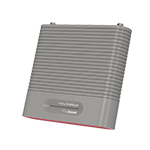
Blocked by walls? Not anymore. The Home Multiroom meets the connectivity needs of most homes, offering incredible power and up to 5,000 sq ft of coverage.
Shop Now: $569.99#2) Cell Tower Distance: The Farther, The Weaker

Cellular signals can only travel so far. Range will depend on the cellular tower's characteristic. While some towers cover just a few miles, others can reach up to 45 miles under ideal conditions.
The further you are from a cell tower, and the more obstacles in the way, the weaker your signal. This is why you’ll notice a sudden drop in service when commuting from your city job to your rural neighborhood, where cell towers are more sparse. With our Cell Tower Locator tool, you can see exactly where and how far your tower is.
Again, the most proven solution is a cell phone signal booster optimized for rural areas. They are equipped with a powerful amplifier and outside antenna to effectively communicate with distant cell towers and deliver a stronger signal where you need it. Alternatively, you can switch to the carrier that offers the best coverage in your area.
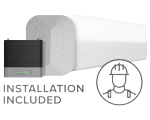
Far away, but never out of reach. The Home Complete Installed is our most powerful home amplifier. Professional installation included ensuring optimal antenna positioning for maximum performance.
Shop Now: $1,499.99#3) Congested Mobile Network: The Frustrating Bottleneck Slowing You Down

Ever struggled to make a call or load a digital menu at a festival despite your phone showing 4 bars of service? This is because there are too many people trying to connect to the network at the same time, casing a jam.
The same thing can happen while at home during peak usage hours or stuck in traffic. One minute you're facetiming with your mom, scrolling on social media, or listening to your favorite song, and the next minute you’re faced with outrageous buffering. Cell towers can only handle so many devices at a time.
To mitigate bad phone signal due to heavy cellular traffic, upgrading your wireless plan may help. Cellular providers often set different usage priorities based on service tiers. You can also use a signal booster to fine-tune the connection between your device and the cell tower, reducing drops and improving performance, even during periods of congestion.

Signal that cuts through the noise. Compact yet powerful, the Home Studio will strengthen your connection during peak hours, ensuring reliable coverage for a home office or living room.
Shop Now: $349.99
Rush hour won’t slow you down. The Drive Reach offers strong communication with cell towers, reducing GPS, music, audiobook, and call drops.
Shop Now: $499.99#4) Landscape: Terrain Can Hurt Your Signal

Anything blocking your nearest cell tower’s line of sight will contribute to a weaker phone signal. This includes tall trees, hills, and mountains. Whether you’re camping in a national forest or live in a valley, you’re prone to reduced reception.
As long as you have a sliver of usable signal outside of your RV or home, a signal booster is your best bet against natural barriers. They will take your weak signal, amplify it, and significantly improve your connection indoors.
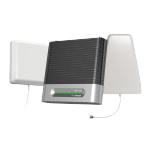
Nature-proof your connection. The Office 100 offers strong amplification in weak signal areas. With the Yagi antenna, it offers more targeted signal transmission for a more dependable connection.
Shop Now: $1,299.99
Camp freely, connect easily. The Destination RV is the most powerful vehicle booster available for stationary RVs. Vacation in national forests or mountain towns without losing touch.
Shop Now: $649.99#5) Weather: Cloudy with a Chance of Connection Issues

Weather phenomena, such as heavy humidity, rain, snow, and ice, degrade signal strength. They disrupt cellular signal waves, causing them to scatter or weaken before they reach your device. Thus, on those particularly stormy or frosty days, your cellular devices buffer and drop connections more than usual.
Unfortunately, there’s not much you can do about inclement weather; it’s out of anybody’s control. Though, a cell phone signal booster can help fine-tune the signal received from your nearest cell tower. Even during bad weather, you'll be able to enjoy clearer calls and faster data speeds.

Signal boost, rain or shine. The Home Complete offers incredible amplification and reach to cell towers, ensuring reliable cellular service for multiple devices no matter the weather.
Shop Now: $999.99#6) Phone’s Age: Outdated Tech Struggles to Keep Up
An outdated iPhone or Android are equipped with weaker antennas and lack support for newer cellular frequencies, making it harder to maintain a strong and stable connection year over year. The best solution for more reliable service is to upgrade your device.
Learn More: Which Cell Phone Gets the Best Reception
#7) Blocking Your Antenna: Your Hand Might Be the Problem
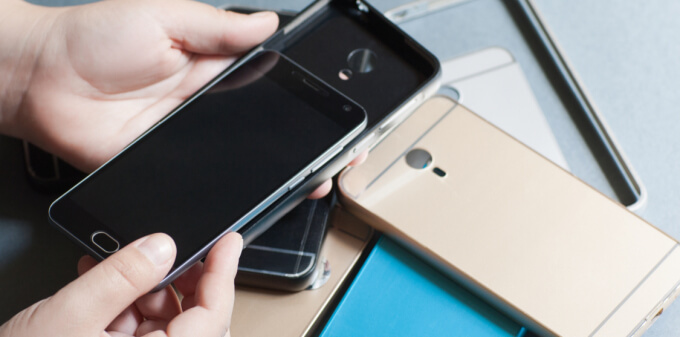
Phones have small antennas embedded inside. Anything blocking them, whether it’s your hand, a magnetic plate, or a metal case, can hurt your reception. Where exactly the internal antenna is depends on your phone model.
A decrease in signal strength due to blocking the antenna may not be noticeable in areas with strong reception. However, it can make a huge difference in near-dead zone environments.
Try to avoid blocking the antenna with your hand or a magnetic phone mount plate. Also, stay away from thick or metal cases that limit the amount of signal the antenna receives.
#8) Low Battery: A Dying Phone Struggles to Stay Connected
Cellular phones need energy to maintain a connection with a cell tower. They may struggle sending and receiving a strong signal when the battery is low.
Don’t put off charging your phone. You may find yourself with a bad phone reception when you need it most. If you don’t have access to a power source, try to have a charged power bank on hand at all times just in case. Or knock out two birds with one stone and boost your signal while you charge your phone at the same time with a mobile signal booster. For more tips, check our guide on how to extend your battery life.
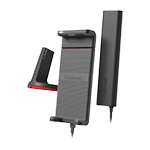
Stay powered, stay connected. The Drive Sleek delivers boosted signal directly to any cellular devices nested in the cradle. Built in charging ports will prevent your phone from dying.
Shop Now: $199.99How to Fix Bad Cell Phone Signal?
Now that you know what’s causing your service to drop, there are many easy ways to boost your cell signal. Though, the most proven solution that solves most issues, as stated many times in this article, is a cell phone signal booster. See our complete cellular booster guide to find the best one for you.
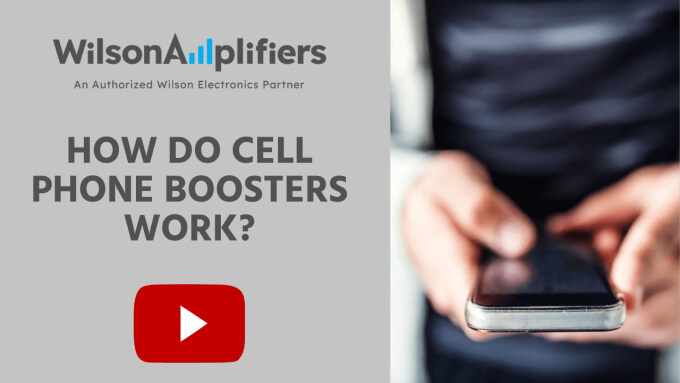
Wilson Amplifier is the leading provider of cellular amplifiers for homes, offices, and vehicles. We've helped hundreds of people get rid of their cellular signal issues across North America. Whatever is causing your signal to go bad, we’ll help transform your connection!
Call us (1-800-568-2723), email (sales@wilsonamplifiers.com), or chat with us, for a free consultation. Ask us anything, we’re happy to help!
FAQs
Why Do I Suddenly Lose Service at Random Times?
Suddenly losing cell service in places where you used to have a reliable connection can be the result of a network outage or new construction blocking your cell tower. Congestion and a connection stuck to a distant cell tower can also cause random service issues. While there's not much a cell phone signal booster can do about outages, it can strengthen your connection to reduce sudden drops.
Why Do I Have Bars but No Service?
There are many reasons why this happens. The main one is congestion. Even though there is a signal available, there is not enough bandwidth to go around, making it seem like there is no service. This also happens during outages. Your phone basically gets confused. It knows that you just had a signal and is desperately searching for one. If your phone struggles to automatically connect to your closest cell tower, some devices will display bars without service. In most cases, the troubleshooting tips mentioned above help reset your connection.
Can a Cell Phone Case Cause Bad Cell Phone Signal?
Yes. Some phone cases can prevent signal from reaching your phone’s internal antenna.
Thin leather, plastic, or rubber cases won’t significantly affect your cell signal. HOWEVER, metal cases, thick battery cases, and the like pose a greater threat to your connection.
Do Magnets Affect Signal?
Electromagnetic fields can cause signal interference, yes.
However, ordinary magnets, such as ones you might find in a bracelet clasp, headphone speaker, or electric motors, will not. There are actually magnets in your cell phones themselves.
Does Poor Cell Signal Drain My Battery?
Definitely. Your phone has to work significantly harder to communicate to and from your cell tower with weaker signal. This results in significantly shorter battery life.
Can an Old Phone Really Cause Bad Service?
Yes. As cellular technology evolves, so do phones.
Older phones don’t have the technology needed to tap into the best and fastest networks available. While your friends are enjoying crisp calls or ultra-fast data, you may be stuck on an unreliable network. As time goes on, older phones also lose software update capabilities, which help with performance.
Does Smoke Make Me Lose Service?
It can. Smoke can reflect and absorb cellular signals, degrading performance. Higher frequencies are affected more than lower frequencies. By how much depends on the density of the smoke.
Why is My Signal Worse in My Car or Truck?
Vehicles are made of metal and glass, which block and weaken cell signals. This is even more noticeable in areas with bad reception since your phone is already struggling to connect. A vehicle cell phone signal booster can help by amplifying the signal inside your car or truck.
Do Phone Cases with Built-In Batteries Affect My Signal?
They can. These cases are often very thick, and some have metal materials, and can interfere with your phone’s ability to pick up a usable signal. If you notice weaker signal, try removing the case to see if it improves.
Why Does My Signal Drop in Certain Rooms of My House?
Signal strength can vary depending on your home’s construction materials and layout. Thick walls, metal roofs, and even energy-efficient windows can block signals. If your signal is weaker in certain rooms, a cell phone signal booster can help improve coverage throughout your home.


Money Back Guarantee

Technical Support